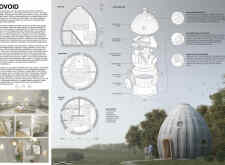5 key facts about this project
The Ovoid architectural concept offers a fresh perspective on micro-home design, emphasizing space efficiency and sustainability. Located within varied natural settings, the structure covers a compact area of 25m². It addresses the common issue of limited space in modern housing while creating an inviting living environment that meets contemporary needs. The overall design is marked by an egg shape, which enhances functionality and provides aesthetic appeal.
Design Concept
The egg shape of the Ovoid reduces the overall surface area, which contributes to higher energy efficiency and durability. This design allows for integration into different landscapes, strengthening the relationship between the built and natural environments. By using advanced 3D printing technology, the construction achieves intricate surface geometries in less time. This approach not only allows for a unique appearance but also aligns with sustainable building practices.
Spatial Organization
Inside the Ovoid, the layout features two distinct levels. The ground floor holds essential living spaces, such as a living area, kitchen, bathroom, and laundry room, along with additional storage options. The mezzanine level works to enhance the home's utility, providing space for a bedroom, workspace, and wardrobe. This thoughtful arrangement makes efficient use of the available space and helps promote comfortable daily living.
Natural Light and Water Management
Natural light is an important aspect of the Ovoid's design, achieved through six carefully placed windows. These openings allow plenty of daylight to fill the interior, creating an illusion of more space and maintaining a connection to the outside. The design also effectively manages rainwater with a corrugated shell that directs water into gutters. The collected rainwater is then stored for filtration and reuse, reflecting the project's focus on sustainability.
Materials and Energy Systems
The construction features ecological cement and reinforced elements, which provide strength and contribute to energy efficiency. Insulation is strategically included in the shell to help maintain a comfortable internal climate. The use of photovoltaic yarn on the dome’s surface is particularly notable, enabling the structure to generate solar energy. This energy system supports the goal of minimizing environmental impact.
Light streams through the dormer window at the top of the dome, illuminating the interior and emphasizing the unique curves of the egg-shaped design. The result is an inviting and well-lit living space that feels open, creating a calming atmosphere within the compact structure.


















































